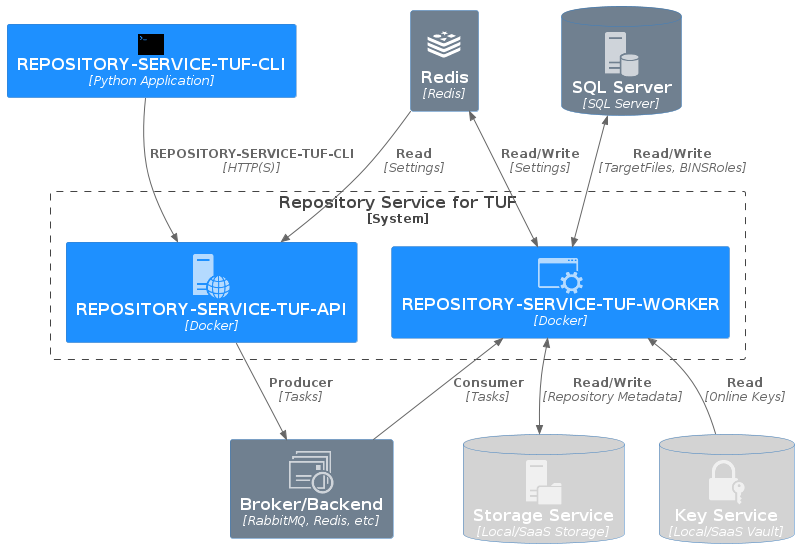Architecture Design
The principles
RSTUF uses The Update Framework (TUF).
It enables RSTUF to be artifact agnostic.
RSTUF is easy to deploy.
RSTUF has an API-first design.
RSTUF is language agnostic, allowing integration by any programming language
RSTUF is process agnostic.
Add/Remove artifacts doesn’t interfere with the existing organizational processes for release/publish.
RSTUF focuses on scalability and Metadata consistency.
RSTUF guides users on TUF processes.
The architecture design principles
The Repository Service for TUF (RSTUF) has two services
(repository-service-tuf-api, repository-service-tuf-worker) and one
command line tool (repository-service-cli), as described in
RSTUF Components.
Note
Other services can be added as optional or required
RSTUF also requires some third-party services described in Required Infrastructure Services.

The below definitions allow RSTUF API and RSTUF Worker scalability.
RSTUF is Asynchronous
RSTUF uses Celery.
Every API request is a task.
RSTUF centralizes all tasks in the Message Queue.
RSTUF stores all task results in the Backend Result.
Repository Service TUF API publishes RSTUF tasks.
Repository Service TUF Worker consumes RSTUF tasks.
RSTUF Repository Settings/Configuration
RSTUF Components are stateless.
Components are configured by runtime environment variables.
Components uses runtime TUF Repository Settings.
Redis stores the TUF Repository Settings using Dynaconf.
Repository Service TUF Worker reads and writes TUF Repository Settings.
Repository Service TUF API reads TUF Repository Settings and writes only during bootstrap process in two stages:
Start a bootstrap process:
BOOTSTRAPtopre-<taskid>.If detects a failure during bootstrap:
BOOTSTRAPtoNone
TUF Repository Settings
TUF Repository Settings are key configurations for the Metadata Repository operations.
RSTUF reserved settings/configuration Key
Value(s)
Description
BOOTSTRAPNone<task id>pre-<task id>signing-<task id>None: No bootstrap<task id>: Finishedpre-<task id>: Initial processsigning-<task id>: Signing processThe<task-id>is the initial bootstrap task
<ROLE NAME>_EXPIRATIONintROOT_EXPIRATION
<ROLE NAME>_NUM_KEYSintROOT_NUM_KEYS
<ROLE NAME>_THRESHOLDintROOT_THRESHOLD
NUMBER_OF_DELEGATED_BINSintNumber of delegated hash bin roles
<ROLE NAME>_SIGNINGNone<json>None: No pending signature(s)json: TUF Metadata pending signatureIt uses the role name uppercaseExampleROOT_SIGNING
Target Files and Target Roles
The TUF top-level Targets Role is only used for delegation. This role does not register target files (artifacts).
PostgreSQL stores the artifacts (
TargetFiles) and Targets delegated roles.Repository Service TUF Worker manages the PostgreSQL database.
Key Vault and TUF Metadata Storage
Repository Service TUF Worker implements and manages the Key Vault and Storage Services.
Access to the Key Vault Service is restricted to Repository Service TUF Worker (read-only).
Writing the TUF Metadata in the Storage Service is limited to Repository Service TUF Worker.
The Storage Service is the only public data.
RSTUF Components Design
Repository Service TUF API
Integration (add/remove artifacts)
TUF metadata process (bootstrap, sign, update, etc)
Note
The service can implement other features without interfering with the RSTUF principles and architecture design principles.
Repository Service TUF Worker
Manages the TUF metadata
Manages the Key Vault and Storage Services
Note
The service can implement other features without interfering with the RSTUF principles and architecture design principles.
Repository Service TUF CLI
Command Line Interface for the API
Guide users in the processes
Note
The service can implement other features without interfering with the RSTUF principles and architecture design principles.
RSTUF Infrastructure Services Design
The Infrastructure Services supports the RSTUF Components operation.
Message Queue
It is a centralized queue service for tasks.
This queue is used as Broker by Celery.
Repository Service TUF Worker and Repository Service TUF API define the supported Queue servers.
Backend Result
It is a centralized backend result used by Celery for task results.
Repository Service TUF Worker and Repository Service TUF API define the supported Queue servers.
Redis
It is a centralized key/cache service.
Optional:
Used as Message Queue.
Used as Backend Result.
Note